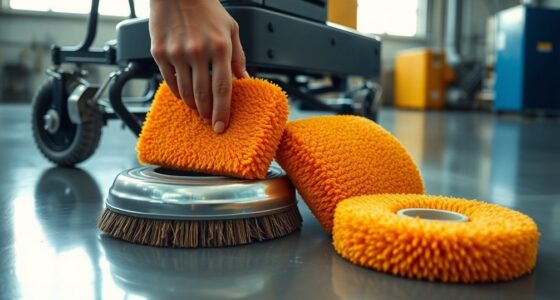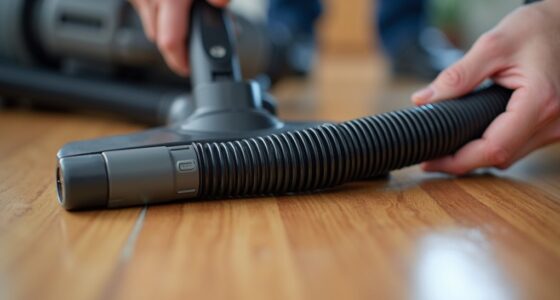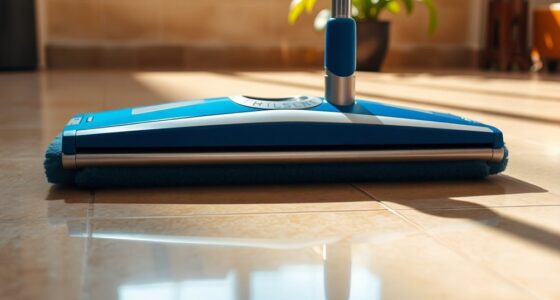Applying too much downward pressure on your tile floors can cause cracks, loosen tiles, and damage grout over time. While tiles are designed to handle regular foot traffic, excessive or concentrated force—like heavy furniture or dropping objects—can lead to costly repairs. To protect your floor’s durability, avoid standing or pressing heavily on tiles unnecessarily. Want to understand more about safe pressure limits and preventive tips to extend your floor’s life? Keep exploring for detailed guidance.
Key Takeaways
- Excessive or concentrated downward pressure can cause cracks, chips, or loose tiles, risking floor damage over time.
- Proper load distribution and using padding under heavy furniture help prevent exceeding safe pressure limits.
- Regular cleaning and sealing of grout maintain its strength, reducing vulnerability to damage from pressure.
- Avoid dragging heavy objects across tiles; lift and carry to minimize concentrated force on floor surfaces.
- Understanding and adhering to the floor’s load capacity ensures pressure stays within safe limits, prolonging tile lifespan.

When you walk across tile floors, the downward pressure you exert can impact their durability and longevity. Every step you take applies force to the tiles and grout beneath your feet. While tile is designed to withstand regular foot traffic, excessive or concentrated pressure can cause cracks, chips, or loosen tiles over time. That’s why understanding how much pressure is too much is essential for maintaining your floors. Proper floor cleaning practices also play a role here, as dirt and debris can weaken grout, making it more susceptible to damage under pressure. Regularly cleaning your grout ensures it remains strong and resilient, helping your entire flooring system withstand daily stresses better.
You might not realize it, but the weight of heavy furniture or appliances placed directly on tiles can exert concentrated pressure that leads to long-term damage. For example, placing a heavy cabinet or a large appliance without proper padding can cause tiles to crack or pop loose. Even when walking, if your shoes are particularly heavy or you carry loads, the force transferred to the tiles increases. It’s important to be mindful of these pressures, especially in high-traffic areas or zones with fragile grout joints. Proper grout maintenance, including sealing and cleaning, helps protect against moisture infiltration and deterioration that can weaken the grout’s ability to hold tiles securely in place. When grout deteriorates, it lessens the overall stability of the flooring, making it more vulnerable to damage under pressure. Additionally, understanding floor load capacity can help prevent accidental overloading that might compromise tile integrity.
If you’re concerned about excessive pressure, consider distributing weight more evenly—use furniture pads or rugs in high-traffic spots. Also, avoid dragging heavy objects across the floor, as this can scratch tiles and loosen grout. Instead, lift and carry items carefully. Maintaining your floors involves a combination of mindful walking habits and routine cleaning. Floor cleaning isn’t just about appearance; it’s about preserving the structural integrity of both tiles and grout. Regularly removing dirt and grime prevents abrasive particles from wearing down grout joints and tile surfaces. Using appropriate cleaning solutions ensures that you don’t accidentally weaken the grout or tiles through harsh chemicals. Keeping the grout well-maintained also prevents water infiltration, which can cause tiles to loosen or crack over time.
Frequently Asked Questions
Can Excessive Down Pressure Cause Tile Cracking?
Yes, excessive down pressure can cause tile cracking. When you apply too much force during installation, especially without proper cushioning mats or using incorrect installation techniques, you risk stressing the tiles. Always use cushioning mats to distribute pressure evenly and follow recommended installation techniques. This prevents undue stress on the tiles, reducing the likelihood of cracks and ensuring a durable, long-lasting floor.
How Do I Measure Down Pressure Applied to Tiles?
You can measure down pressure on tiles using measuring techniques like pressure gauges. Attach a pressure gauge to the tool or device applying force, then read the pressure directly. Alternatively, you can use a digital force meter for precise measurements. Always verify your gauge is calibrated correctly to get accurate readings. This way, you’ll know if you’re applying too much pressure that could crack or damage your tiles.
Does Tile Material Affect Tolerance to Down Pressure?
Think of tile material differences as a knight’s armor—some are more resilient than others. Your choice impacts how much down pressure the tiles can tolerate. Porcelain, for example, withstands greater force than ceramic, especially with proper installation techniques. Always consider the specific material and install method to prevent damage. If you apply excessive pressure, the tile’s durability could be compromised, leading to cracks or broken tiles.
Are There Specific Tools to Reduce Down Pressure During Installation?
You can use specialized tools like tile spacers and leveling systems to help reduce down pressure during installation. These tools guarantee even adhesive strength and proper grout compatibility, preventing excessive force that could damage tiles. By carefully applying these tools, you maintain the integrity of the adhesive and grout, reducing the risk of cracking or lifting. Always follow manufacturer guidelines for your tile material to avoid applying too much pressure.
What Signs Indicate Too Much Down Pressure on Tiles?
You’ll notice signs of too much down pressure on your tiles if the grout cracks or tiles start to shift. Excessive pressure can compromise subfloor stability, causing tiles to loosen or crack over time. Watch for uneven surfaces or tiles that feel loose underfoot. Applying the right amount of pressure guarantees proper bonding without damaging grout durability or risking tile failure. Adjust your force to maintain a stable, even surface.
Conclusion
Remember, applying too much down pressure on your tile floors can cause cracks and damage, much like opening Pandora’s box. You want to be gentle, like a careful knight in shining armor, ensuring your tiles stay pristine. If you heed this advice, your floors will stand strong through ages of wear and tear. Don’t let your floor’s durability become a tragedy of Hamlet proportions—treat it with the respect it deserves, lest you regret it later.









